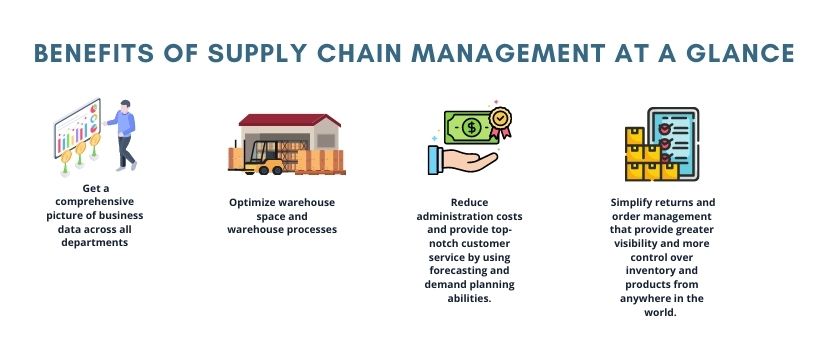Summary: Supply Chain Management (SCM) is a critical department for a company belonging to any department. It deals with acquiring raw materials, manufacturing finished products, managing quality checks, and finally ensuring that the end-consumer receives the product within the specified time. Enterprise Resource Planning (ERP) software plays a pivotal role in enabling SCM companies to ensure every process runs smoothly and efficiently. It also reduces resource wastage, ensures product dimensions are accurate, and that each department gets access to crucial financial data instantly.

Core capabilities of Supply Chain Management ERP software
1. Fully embedded in the ERP software
Share critical business data in real-time with each stakeholder and provide a unified view to everyone.
- SCM module integrates with your base ERP software conveniently.
- It provides a unified view of your business to each department.
- You don’t need to spend extra money buying third-party integrations.
- Critical business data is uploaded in real-time from anywhere, anytime, and any connected device.
- Embedded SCM solution provides additional functionalities like centralized procurement and customer order sourcing.
2. Simplified order and returns management
Ensure the best customer experience by reducing response time and minimizing costs with the full multi-site capability feature of the ERP software’s supply chain management module. In addition, this module will ensure data connectivity and maintain traceability by supporting a broad range of logistic scenarios.
- The centralized return capability feature simplifies order returns. You can return items irrespective of their delivery date and the company site from where you ordered them.
- Change management and validation ensure you get a consolidated view of all entities across different sites and countries.
- A reliable order acceptance procedure includes automated rule-based sourcing, supply site availability, CTP (Capable To Promise), and multi-site ATP (Available to Promise) capabilities.
3. Smart Warehouse management
Supply chain management software meets customer demands with intelligent delivery processing, putaway, and pick-up. Other advantages include:
- Reduce the time spent moving between storage bins by defining warehouse routes, wave picking, and storage zones for rule-based putaway.
- Minimize human error and save time & resources by configuring mobile scanning solutions. Moreover, the warehouse data collection, an advanced SCM tool, increases accuracy and speed by picking customer orders using barcodes.
- Create serial and batch numbers for shelf life, full up and down traceability, and expiration date management.
- Increase warehouse space by frequency and slotting-based putaway, ensuring that essential items are readily accessible.
- Ensure precise delivery processing by automating shipment processes and modeling departure schedules that allow configuring your shipment flows.
4. Forecasting and planning
The supply chain management module has crucial planning and forecasting abilities allowing businesses to better customer service, minimize administration costs, and maximize ROI. It will also help you to:
- Efficiently plan and replenish inventory. This feature allows you to respond to changing market trends and customer preferences quickly and efficiently.
- Improve your forecasting ability by employing numerous statistical forecasting models, including Bayesian, Best Fit, Brown’s level, etc. This feature will help you to acquire the exact quantity of raw materials and produce the required number of finished products at the right time.
- Manage a vast amount of parts, materials, and finished products accurately and efficiently. You can group parts based on lifecycle stage and frequency and set up manual parameters like service level.
5. Built for the demands of the future
The supply chain management module allows you to reuse, reduce, and recycle materials allowing you to be a part of the circular economy. This way, you can minimize waste across the entire supply chain. Other benefits include:
- Monitor your environmental impact easily and check whether your business processes are environmentally sustainable.
- A business becomes more sustainable by operating in closed material cycles. The SCM module has several features: return material handling, condition codes, lot batch tracking, serial tracking, and configured parts that ensure your business is sustainable by operating in closed material cycles.
STAY UPDATED
Subscribe To Our Newsletter
At Sage Software Solutions (P) Ltd., we are home to world-class ERP software and CRM software that will solidify your business tech support fundamentals and enable you to build a customer-centric organization. You can also write to us at sales@sagesoftware.co.in.
Disclaimer: All the information, views, and opinions expressed in this blog are those of the authors and their respective web sources and in no way reflect the principles, views, or objectives of Sage Software Solutions (P) Ltd.





